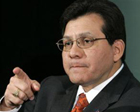|
|
|
Court awards oral surgeon $750,000 in boar-tusk case
Court Watch |
2007/07/27 10:12
|
| A local oral surgeon should have been backed by his insurance provider when an employee sued him for putting fake boar tusks in her mouth and taking photographs while he performed a dental procedure on her, the state Supreme Court decided today. The court ruled that Auburn dentist Robert Woo should have received legal defense from Fireman's Fund Insurance, restoring an original jury verdict to award the dentist $750,000 after it was overturned by an appeals court. In a dissenting opinion, one justice wrote that today's decision "rewards Dr. Woo's obnoxious behavior and allows him to profit handsomely," while also calling the original incident involving his assistant "intentional offensive and likely tortuous conduct." Woo will get $750,000 in damages, attorney fees, and is also reimbursed the $250,000 that he paid to settle the original lawsuit with his employee. The eight-year legal jumble can all be traced back to a pot-bellied pig named Walter, owned by Woo's surgical assistant. The assistant, who worked for Woo for five years, talked frequently about Walter in the office, and about the abandoned pot-bellied pigs that she cared for, according to court documents. Woo made several remarks, including how he would like to barbecue Walter, documents said. He went on a boar-hunting trip and brought back pictures of a dead boar to show the assistant. Woo claimed that his comments were just part of a "friendly working environment," documents said. But then he pulled out the fake boar tusks. The assistant needed to have two teeth replaced with implants, and Woo told her he could do it, documents said. Woo prepared a pair of fake boar tusks and, while his assistant was sedated for the procedure, Woo removed the oxygen mask, inserted the tusks in her mouth and took photos without her consent. He later developed the pictures and showed them to employees, and later one of his other employees gave them to the assistant as a birthday present. The assistant was stunned. So stunned that she filed a lawsuit with several complaints against the dentist, including invasion of privacy, infliction of emotional distress and medical negligence. Woo sought defense with his insurer, Fireman's, who would not defend him because his actions did not fall under "dental services," documents said. Woo settled with his assistant for $250,000 and then took his insurer to court. In June 2003, the King County Superior Court jury awarded the dentist $750,000, but that was overturned two years later by the state Court of Appeals, although it left the $250,000 settlement intact. |
|
|
|
|
|
|
Embattled Gonzales talks crime-fighting in Indy
Breaking Legal News |
2007/07/27 10:11
|
| Embattled Attorney General Alberto Gonzales is in Indianapolis Friday addressing law enforcement assigned to sex crimes. Gonzales' appearance comes one day after Senate Democrats called for a special prosecutor to investigate whether he committed perjury. Gonzales faces new questions about his credibility because of apparent contradictions between his sworn Senate testimony and an intelligence official's statements. As a result, Senate Judiciary Committee Chairman Patrick Leahy, D-Vt., has threatened to request a perjury investigation of Gonzales. Gonzales didn't mention this latest controversy, instead, sticking to his speech to law enforcement. "My promise to this group and to the parents of America is that I'm committed. I will not rest, even after I'm no longer attorney general, until this nation is better able to shield our children from crimes," he said. Gonzales has resisted calls from members of Congress to step down as attorney general. The White House defended Gonzales on Thursday against accusations he gave misleading testimony to Congress. A key Republican senator critical of Gonzales said there was no sign that President Bush's support for the attorney general was weakening.
Sen. Arlen Specter, the top Republican on the Senate Judiciary Committee, accompanied Bush on an Air Force One on a trip to Philadelphia. At a hearing on Tuesday, the Pennsylvania Republican had told Gonzales, "I do not find your testimony credible, candidly." The senator Thursday that Bush was sticking by Gonzales out of personal loyalty, despite the attorney general's deteriorating support on Capitol Hill. "The hearing two days ago was devastating (for Gonzales). But so was the hearing before that and so was the hearing before that," Specter said.
|
|
|
|
|
|
|
Calif. Court Rules Against Car Seizures
Legal Business |
2007/07/27 06:10
|
| A sharply divided state Supreme Court ruled that California cities can no longer seize vehicles whose drivers are arrested for allegedly buying drugs or soliciting prostitutes. The ruling Thursday overturns the laws of more than two dozen cities from Oakland to Los Angeles that allowed police to seize a vehicle immediately after its driver's arrest. Even drivers suspected of buying a small amount of marijuana, a low-level crime punishable by a $100 fine, faced seizures in many of the cities with the ordinances. The 4-3 ruling said only state law can mete out punishment for drug and prostitution offenses and without authorization from the Legislature, cities can't pass seizure ordinances that are harsher than state and federal laws. Many urban city councils said they enacted the seizure laws as a way to combat drug sales and prostitution and clean up some of their most blighted neighborhoods. The ruling didn't address newer city laws that allow police to seize cars allegedly participating in illegal street races and "sideshows." |
|
|
|
|
|
|
Mulroney Vows To Fight Court Ruling
International |
2007/07/27 03:12
|
| Brian Mulroney has filed a motion to set aside a court ruling ordering him to pay $470,000 to former business associate Karlheinz Schreiber. The ruling, which caught Mulroney's lawyers off guard, came Thursday in a default judgment by the Ontario Superior Court of Justice. The motion being argued today in a Toronto courtroom says the judgment was made in the face of a pending motion that challenged the Ontario court's jurisdiction. In the motion, Mulroney's lawyers argue their client successfully met the deadline to respond to a lawsuit filed by Schreiber. The motion argues Mulroney can't be found in default without an express court order delivered with proper notice to his lawyers. Schreiber sued the former prime minister to recoup $300,000 in cash the businessman says he handed to Mulroney over three meetings in hotel rooms in New York and Montreal in 1993 and 1994. |
|
|
|
|
|
|
Court: Russia to Pay Chechens
International |
2007/07/27 02:13
|
| The European Court of Human Rights ordered the Russian government to pay damages of $196,000 to the family members of 11 Chechen civilians killed by Russian soldiers in 2000. The court, in a Thursday ruling, suggested that by not bringing the soldiers to justice, Russian prosecutors had implicitly accepted the massacre in Novye Aldi, when security forces rampaged through the town, setting fire to houses and killing at least 50 civilians. ``The astonishing ineffectiveness of the prosecuting authorities in this case can only be qualified as acquiescence in the events,'' the court said in its decision. Moscow has denied that its security forces are guilty of atrocities in the southern Muslim republic of Chechnya, where two wars have been fought to re-establish Russian control following the collapse of the Soviet Union in 1991. But relatives of Chechen victims have recently been seeking reparations from the Strasbourg-based human rights court - and winning. Russia said last week that it wanted to restrict the flow of appeals to the court by allowing its citizens to file human rights cases against the state in Russian courts - something they cannot do now. Chechens have opposed this move, saying they fear the government wants to deprive them of their only hope for justice. The court has issued more than 10 verdicts against Russia in the past few months in cases concerning the Chechen wars. Some 200 are still pending.
|
|
|
|
|
|
|
Aquila settles class-action suit for $10.5M
Class Action |
2007/07/26 11:34
|
| Aquila Inc. has agreed to settle for $10.5 million a class-action lawsuit that alleged the company should have recommended dumping its stock from employees' retirement funds during Aquila's risky boom years. "It's just more efficient for the shareholders for us to settle than to go through a protracted legal case," Aquila spokesman Al Butkus said Wednesday. Aquila admitted no wrongdoing as part of the settlement, Butkus said. The company will record the $10.5 million charge in its second or third quarter, he said. The proposed settlement was filed Monday with the U.S. District Court for the Western District of Missouri. The suit was filed in late September 2004 in the U.S. District Court in Kansas City. A former employee sued the Kansas City-based company (NYSE: ILA) and its board of directors for promoting the company's stock as a "conservative" investment for participants in the company's retirement plan. The class included more than 7,000 current and former employees who put Aquila stock into the company's retirement plan from 1999 to May 5, 2004. A hearing on the settlement' s final approval has been scheduled on Nov. 13 before U.S. District Judge Dean Whipple.
|
|
|
|
|
|
|
Law firm urges fire victims to sue agency
Legal Business |
2007/07/26 11:33
|
| A California law firm is running television ads in the Reno-Lake Tahoe area seeking potential plaintiffs who want to file lawsuits over the loss of their homes in a big wildfire last month. The ad tells viewers that if they lost a home on a lot with pine needles, shrubs or trees, they might be entitled to compensation. The fire destroyed 254 homes and 75 other structures in late June near the city of South Lake Tahoe. Fliers posted on trees in the burned area also urge residents to mount a lawsuit against the Tahoe Regional Planning Agency, which enforces environmental regulations in the Lake Tahoe Basin. Some Tahoe residents have blamed the agency for the fire, saying the agency's regulations aimed at preserving the clarity of the lake made it difficult to clear pine needles, trim brush and cut trees around properties to create defensible space. In the subdivision damaged in the Angora fire, an assessment found that 19 percent to 34 percent of the homes had created defensible space. Larry Parker, the personal injury lawyer cited in the television ads, did not return a telephone call by the Associated Press to his Long Beach office Tuesday seeking comment. The Reno Gazette-Journal reported that the firm sent the newspaper an e-mail Monday that said the firm "has represented over 100,000 injury victims during the past 30 years and recovered over $750,000,000 for its clients." Tahoe Regional Planning Agency officials said they've seen the ads and the fliers but haven't received any notification of legal action. The agency says it relaxed tree-cutting policies in recent years and can't be blamed for the blaze. "We've tried to convey clearly that most defensible-space work is possible under existing rules," said Julie Regan, agency spokeswoman. "If you look at the work that's been done in Incline Village, it's been done under the same rules as the South Shore," she told the newspaper. "It's unfortunate that some businesses and attorneys are trying to take advantage of this community by using scare tactics." Agency regulations say: "Leave the 'duff' layer of pine needles in your yard -- do not rake them all up. The 'duff' layer is the dark area at the ground level where the pine needles are decomposing. This matter does not burn easily." Other residents said they didn't want agency inspectors on their property because they fear they will be cited for violations of the agency's erosion-control measures. That fear creates a "paralysis" among homeowners who want to make changes on their property, residents and fire experts said last month. Agency officials say the regulations weren't responsible for the blaze but are open to changes. "We have been open to amending policies and ordinances in an effort to better address fire safety at Lake Tahoe," John Singlaub, the agency's executive director, said. "Following the Angora fire, a robust community debate is in order to help prevent such a catastrophic event from occurring in the future." |
|
|
|
|
|
|
Class action or a representative action is a form of lawsuit in which a large group of people collectively bring a claim to court and/or in which a class of defendants is being sued. This form of collective lawsuit originated in the United States and is still predominantly a U.S. phenomenon, at least the U.S. variant of it. In the United States federal courts, class actions are governed by Federal Rules of Civil Procedure Rule. Since 1938, many states have adopted rules similar to the FRCP. However, some states like California have civil procedure systems which deviate significantly from the federal rules; the California Codes provide for four separate types of class actions. As a result, there are two separate treatises devoted solely to the complex topic of California class actions. Some states, such as Virginia, do not provide for any class actions, while others, such as New York, limit the types of claims that may be brought as class actions. They can construct your law firm a brand new website and help you redesign your existing law firm site to secure your place in the internet. |
Law Firm Directory
|
|









